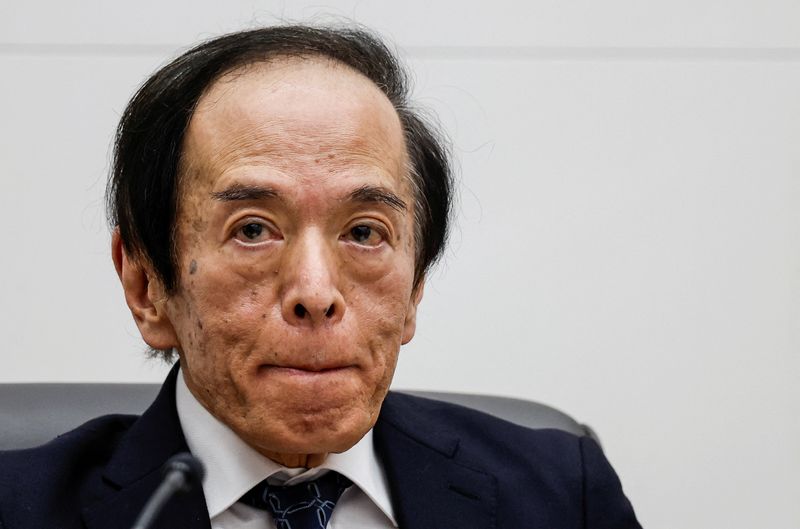By Leika Kihara
NAGOYA (Reuters) -Bank of Japan Governor Kazuo Ueda said the economy was progressing towards sustained wages-driven inflation and warned against keeping borrowing costs too low, leaving open the chance of another interest rate hike as early as next month.
In a sign the BOJ was likely to push rates up again soon, Ueda said the bank must whittle down stimulus in a timely fashion as keeping real interest rates low for too long could accelerate inflation more than expected.
Markets were keeping a close eye on the governor's comments on Monday, which were his first on monetary policy since Donald Trump's victory in the U.S. presidential election on Nov. 5.
He also said the central bank wouldn't necessarily wait for external risks, such as uncertainty over Trump's economic policy, to completely fade before raising rates again.
"There are numerous uncertainties we need to scrutinise. But that doesn't mean we will wait until all of them clear up. We'll decide policy looking at data and information available at the time of each meeting," Ueda told a news conference on Monday.
"We're seeing progress on the domestic front," Ueda added, pointing to growing signs that wage hikes will continue and prod companies to raise prices not just for goods but services.
But he offered few clues on whether the BOJ would raise rates in December, disappointing traders who bet the governor could drop clearer hints of a policy shift next month.
"The timing for when we'll adjust the degree of our monetary support will depend on the economic, price and financial outlook," the governor said in a speech to business leaders in the central Japan city of Nagoya.
The lack of clear guidance on the next rate hike timing pushed up the dollar by 0.35% to 154.72 yen on Monday, off Friday's low of 153.86.
It also left the market pricing in a 54% chance of a quarter-point hike at the BOJ's next meeting on Dec. 18-19, little changed from before Ueda's speech.
A Reuters poll conducted on Oct. 3-11 showed a slim majority of economists projecting the BOJ to forgo raising rates this year, although nearly 90% expect rates to increase by March.
The BOJ ended negative interest rates in March and raised its short-term policy rate to 0.25% in July on the view Japan was on the cusp of durably achieving its 2% inflation target.
Ueda cited rising inflationary pressure from a weak yen, which boosts import costs, as among factors that led to the July rate hike. That has led many market players to wager that yen moves will be key to how soon the BOJ will next raise rates.
"It's true a weak yen pushes up costs and has a big negative impact on consumers. But it's positive for exports and inbound tourism. The overall impact on Japan's economy isn't easy to assess," Ueda said on the yen's recent declines.
BOJ HAS 'FREE HAND'
When asked about Trump's return to the White House, Ueda said it would take a long time before there is clarity on his economic policies.
"If one were to assume the BOJ will lay the groundwork before raising rates, the chance of a December hike declined," said Toru Suehiro, chief economist at Daiwa Securities.
"But you could also say the BOJ simply left itself a free hand, as the bias of Ueda's remarks was toward more hikes."
Ueda said rising wages and robust profits were pushing up consumption and capital expenditure, voicing confidence that domestic conditions were ripe for a near-term rate hike.
Companies were raising prices not just for goods but services in October, a month when they typically review prices, in a sign inflation was being driven more by domestic demand and higher wages, than rising raw material costs, Ueda said.
"We expect wage-driven inflationary pressure to heighten, as the economy continues to improve and companies keep hiking pay," Ueda said, adding the focus for the BOJ's monetary policy would be on whether wage and price growth will continue to accelerate.
Another consideration, he said, was whether global growth will keep expanding and underpin Japan's export-reliant economy.

"The chance of the U.S. economy achieving a soft-landing scenario appears to be increasing," Ueda said, adding that market sentiment was improving due to receding concern over the U.S. outlook.
But the central bank must remain vigilant to external risks and the chance of renewed market volatility from geo-political risks, he added.